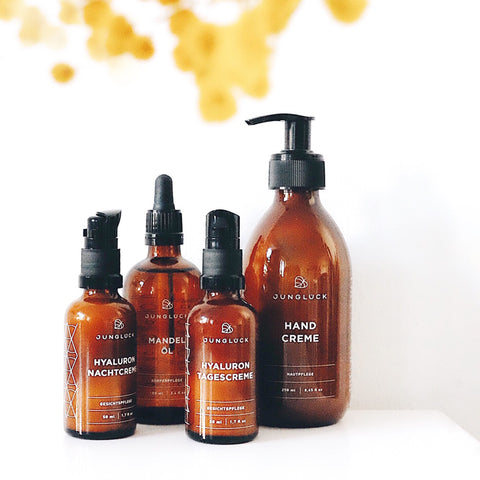
November 19, 2020
ROSACEA, NEURODERMATITIS AND COUPEROSE – WHAT TO DO?
by Leonie Poppe
ROSACEA, NEURODERMATITIS AND COUPEROSE – WHAT TO DO?
Do you sometimes just want to hide? Itching, burning, dry patches - this can be quite a strain on the body and soul. But what is really behind the diagnosis of couperose, rosacea or neurodermatitis? In this article, we will tell you more about the topic, clarify symptoms and causes and give you tips that can help you in such situations.
01 Rosacea
02 Neurodermatitis
03 Take the wind out of your sails
04 Which junglück products can you use
05 Curse or blessing – cortisone creams
06 Good Food, Good Times – Influencing Factor Nutrition
[Mr]
01 ROSACEA
What is rosacea?
Red cheeks! They have been a sign of good health, happiness and a positive aura for centuries. But what can you do if your cheeks have a permanent red color that doesn't go away? The dermatologists usually diagnose rosacea.
Translated, this is a chronic inflammatory skin disease that occurs in phases and with varying degrees of severity. It usually first appears between the ages of 30 and 40. Initially, the symptoms may subside, but in later stages the traces remain clearly visible.
How does rosacea progress? And what is couperose?
At the beginning, so-called flushes (rosacea diathesis) often occur. Sudden, fleeting reddening of the skin. The main regions are the cheeks, nose, chin and middle of the forehead. In the next stage (rosacea erythematosa-telangiectatica), the blood vessels dilate. This makes small veins visible to the naked eye and the connective tissue loses strength. This means that the cells cannot contract again. Itching, dryness, flaking, burning and stabbing pains are not uncommon in this stage. The skin looks a little as if it had been exposed to too much sun. And this condition is then also known in technical terms as couperose.
When the stage of rosacea papulopustulosa is reached, inflammatory red blisters (pustules) and small nodules appear under the skin (papules). This is often misdiagnosed as acne. The skin looks similar at first glance.
Grade III rosacea (glandular hyperplastic rosacea) is then ultimately manifested by enlarged connective tissue cells and sebaceous glands. Tuberous growths can be the result and are very stressful for those affected.
The phases of rosacea are fluid. However, with proper care and an adapted lifestyle, symptoms can be alleviated and flare-ups reduced.
What causes rosacea?
Unfortunately, there are currently no clear triggers for rosacea. There are some assumptions! For example, genetic factors are said to play an important role. However, there is no scientific evidence for this. Too much UV radiation, too high temperatures and other environmental pollution such as pollen and exhaust fumes are mentioned as possible causes. And chemical ingredients such as perfumes or fragrances, detergents that are too alkaline or drug-related side effects are also suspected. As you can see, there are many assumptions, but no certainty!
One thing is clear: skin that is plagued by rosacea needs care that is as non-irritating as possible and therefore does not cause additional irritation.
[Mr]
02 NEURODERMATITIS
What is neurodermatitis?
“Please don't scratch, I'm sensitive!” That's what someone with neurodermatitis would probably think. Neurodermatitis, also known as atopic dermatitis, is also a chronic inflammatory skin disease. Unlike rosacea, it can develop in childhood and disappear over the years. However, sometimes it persists.
What are the characteristics of neurodermatitis?
- Very dry skin
- severe itching and
- red, scaly rash
These are the most common symptoms of neurodermatitis. The crooks of the arms and knees, neck and hands are the most commonly affected areas. But itching and other symptoms can also spread to the rest of the body. If you have neurodermatitis, you may be familiar with it: sleepless nights and, if it was really bad, even wearing gloves to avoid scratching yourself inadvertently. This is often not easy, especially for children.
How does neurodermatitis develop and what are its causes?
Here too, scientists agree. Genes play an important role in the development of neurodermatitis. The altered skin structure with a resulting altered skin barrier is the main cause and is responsible for the typical symptoms. Allergens and other irritants can penetrate the skin more easily. As a result, skin affected by neurodermatitis reacts much more strongly to external influences than healthy skin would.
That's why caution is advised here too. Because at this point it is very important to pay attention to what comes into contact with the skin. But which care products help relieve the itching and can I use them on my sensitive skin?
[Mr]
03 TAKE THE WIND OUT OF THE SAILS
This quickly leads to a vicious circle. The damaged skin barrier causes irritation, which further breaks down the protective film and allows germs to penetrate. This causes further irritation. Our immune system reacts with a red alert and immediately responds with even more sensitivity. And so it goes on and on and on. Now it's time to STOP. Break the vicious circle and take the wind out of its sails. Important: Keep the stress factors for your skin as low as possible.
From a mild cleanser to an anti-inflammatory cream, there are a few things to consider when choosing the right products:
- Use mild cleaning products, for example with gentle sugar surfactants (shower gel)
- Avoid frequent contact with water
- Wash with cold to lukewarm water, too hot irritates our acid mantle
- No excessive pressure or friction
- Use products for spraying to avoid additional friction
- Avoid mechanical and chemical peelings
- use creams with a high water content
- pay attention to moisturizing care
- avoid oily products
- use sufficient sun protection with mineral filters
- Do not allow comedogenic substances to come into contact with your skin
- Avoid perfumes, fragrances and chemical preservatives
- Remove mineral oils and silicones from your list
- If possible, only use a deodorant for sensitive skin
[Mr]
04 WHICH JUNGLÜCK PRODUCTS CAN I USE FOR NEURODERMATITIS OR ROSACEA?
From the very beginning, we have taken to heart the requirements that a care product must meet in order to be suitable for sensitive skin. With a few exceptions, you can use almost all of our products on irritated and stressed skin.
Especially in this case, it is important to strengthen the skin and allow it to heal and regenerate.
For example, we have our rose water spray as a facial tonic. It soothes your skin in the first step of your care routine and has an antibacterial yet gentle effect.

[Mr]
Our aloe vera gel is a true all-rounder from head to toe. Whether as a serum, body lotion or even a cold compress in very acute cases, it is a faithful companion. Due to the evaporation effect on the skin, it also has a pleasantly cool effect on the skin. We also have it in our range as an aloe vera spray , for quick use in between or for places that are not easy to reach with one hand.
Our Hyaluron creams are also based on aloe vera and therefore have a high water content. In combination with hyaluronic acid, they provide valuable moisture and essential nutrients to soothe and sustainably strengthen your skin. Redness is neutralized, your cells become more resilient and hypersensitivity is specifically reduced.
Does your dry skin need an extra portion of nutrients? Then try our pure almond oil , for example. It is particularly well tolerated and is therefore often used in baby care. Almond oil supplies your skin with all the important vitamins, lipids and antioxidants.
If that's too rich for you, you can use rosehip seed oil . With its high proportion of carotenoids (provitamin A), the oil has an antioxidant effect and stimulates cell renewal. It is also rich in polyunsaturated fatty acids that nourish your skin and strengthen its protective barrier. It also supports cell renewal and helps the skin to renew itself. You can find out more about our rosehip seed oil in this article .
Sunscreen is a MUST for the day. With SPF 30, mineral filters prevent further inflammatory reactions and skin damage.
And for in-between times: our hand cream. Thanks to ingredients such as vitamin E, radish root and aloe vera, it noticeably strengthens the skin barrier and does not burn open areas.
[Mr]
05 BLESSING OR CURSE – CORTISON CREAMS
However, if you can't stand it any longer and go to a dermatologist, you will often leave the practice with a prescription for a cortisone ointment. Cortisone is a hormone produced by the body in the glucocorticoid category. Like many other hormones, cortisone is produced in the adrenal cortex and distributed from there throughout the body. Among other things, it is involved in regulating inflammatory processes and suppresses an excessive immune reaction. Cortisone ointments therefore provide relief for our skin.
It sounds simple at first, but there are a few things to consider here too! The creams should only be applied locally to the affected areas and the application should not be stopped suddenly. Slow withdrawal prevents a relapse. These forms of administration should also not be used for longer than 6 weeks at a time. However, the skin structure can suffer in the long term.
Possible consequences:
- Skin thinning
- poor wound healing
- Hair root inflammation
- Pigment disorder
However, we are back in the area of pharmacy and as we know: the dose makes the difference! Therefore, this is all generalized and the doctor's individual recommendation should be followed!
06 GOOD FOOD, GOOD LIFE – INFLUENCE FACTOR NUTRITION
It's all about the food - Even with rosacea or neurodermatitis, the question often arises - what role does our diet play in all of this? Exact correlations are not yet known, but there are some guidelines that should be followed. For example, you should make sure you eat a balanced diet as much as possible so that there are not too many acid-producing substances in the body and the immune system does not have to work overtime. Excessive consumption of dairy products and animal fats should be reduced. Instead, omega 3 fatty acids and lots of vegetables and fruit are important for the body.
Spicy spices and excessive exertion can stimulate blood circulation and should therefore be avoided as much as possible, as this means more stress for our cells.
CONCLUSION
Our skin is a mirror of our soul - this is once again very clear in this context. Every skin is different and has different needs. If your skin is a more sensitive type, it is even more important to recognize and determine your own skin characteristics and to base your lifestyle on them. When it comes to skin in particular, mindfulness is the best medicine! Listen to yourself and trust your body - it will show you what is really good for you!
[Mr]
Click here to go directly to our products.
With that in mind, be fair to yourself and stay healthy!
Sophia and Leonie
[Mr]






